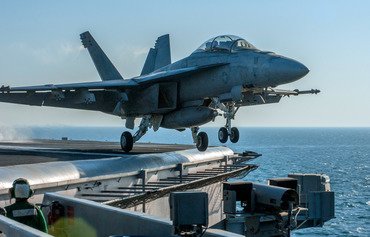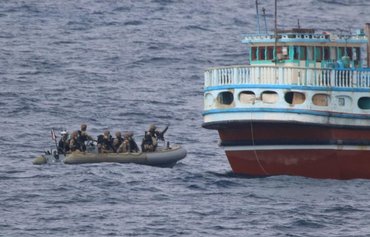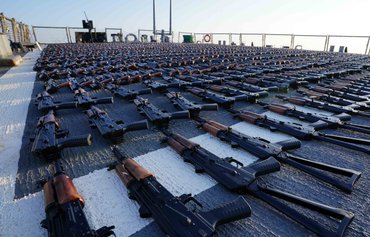The Combined Maritime Forces (CMF) continue to play a central role in protecting the free flow of commerce, improving maritime security and deterring illicit activity in the international waters surrounding the Arabian peninsula.
The main focus of the 32-nation force is defeating terrorism, preventing piracy, encouraging regional co-operation, and promoting a safe maritime environment.
The multinational force is commanded by a US Navy Vice Admiral based in Bahrain, with a UK Royal Navy Commodore serving as deputy and other senior staff roles filled by personnel from member nations.
The CMF operates in approximately 3.2 million square miles of international waters, which include some of the world’s most important shipping lanes.
The level of participation among the 32 nations of the partnership varies according to their ability to contribute assets, with the US Navy's 5th Fleet and French naval forces among those playing a leading role.
The US Navy's 5th Fleet is based in Bahrain, while the French operate out of Camp de la Paix naval air station, also known as Abu Dhabi Base, in the UAE.
"The French naval forces present in the Gulf region play an essential security role," said Col. Rashid Mohammed al-Marri, formerly of the Dubai Police Anti-Narcotics Department.
"Many of the counter-terrorism, counter-smuggling, counter-piracy and mine detection operations in the Gulf were carried out by these forces over the past years," he told Al-Mashareq.
Since it was established a decade ago, the French base in the UAE has enabled the provision of additional logistical support for naval vessels, he said.
Strong relationship with GCC
The French Navy conducts periodic drills, exercises and maneuvers with the navies of the Gulf states and Egypt, and enjoys an excellent relationship with Gulf Co-operation Council (GCC) states, al-Marri said.
All six GCC states -- Saudi Arabia, the UAE, Kuwait, Qatar, Bahrain and Oman --have maritime borders on the Arabian Gulf or the Red Sea, he added.
They are close to key waterways such as Bab al-Mandeb and the Suez Canal, which serve as passageways for international trade but also can be exploited as routes for smuggling, piracy, drug trafficking, and the movement of terrorists.
To thwart such activity, the French Navy conducts co-ordinated patrols with the US Navy's 5th Fleet, and contributes to sea mine detection and clearance operations, with a naval minesweeper conducting periodic patrols in the region.
The French commitment includes the rotating command of Combined Task Force 150 (Maritime Security Operations and Counter-Terrorism), which specialises in vessel monitoring and rapid intervention in drug-trafficking or terrorism cases.
Waters of international importance
In March, the French warship Jean de Vienne seized over four tonnes of hashish during an operation in the international waters of the Arabian Sea, the CMF said.
French navy teams cleared waters off Kuwait of mines and hazardous wastes, particularly near Nuwaiseeb Power Plant, al-Marri said, and naval forces have taken part in mine clearance operations off Yemen's Red Sea coast.
The French navy has aircraft carriers, frigates, escort vessels and speedboats designed for maneuvers, attacks and rapid intervention on hand, Saudi military expert Maj. Gen. Mansour al-Shehri (retired) told Al-Mashareq.
The Western naval presence in the Gulf region, which includes the US, Britain, France and Australia, is long-standing, said military analyst Brig. Gen. Abdul Karim Ahmed, who is retired from the Egyptian military.
This is because "the security of these waters is of vital importance to world trade, not only to the countries of the region", he told Al-Mashareq.
The enforcement and strengthening of security therefore has a positive impact for the entire world, he said, as these waters link Europe and Asia.

![Marines stand on the deck of the French frigate Chevalier Paul (D621) in Toulon, southern France, on November 21st, 2017, during its departure to the Mediterranean Sea for a mission in the Gulf. [Anne-Christine Poujoulat/AFP]](/cnmi_am/images/2018/07/23/13618-French-marines-ship-600_384.jpg)






